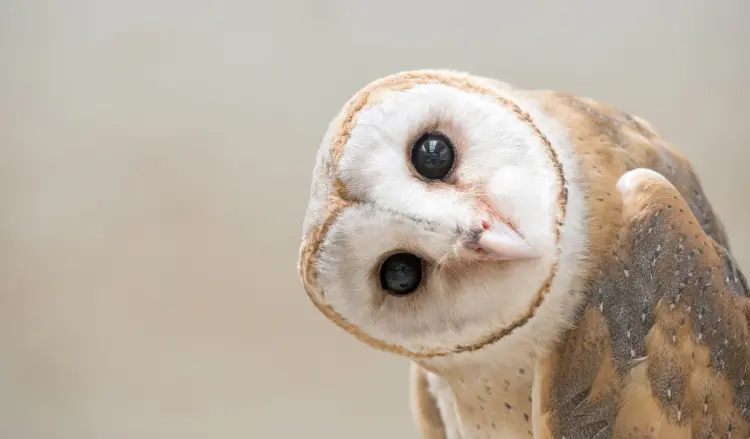There is no place for racism in birding
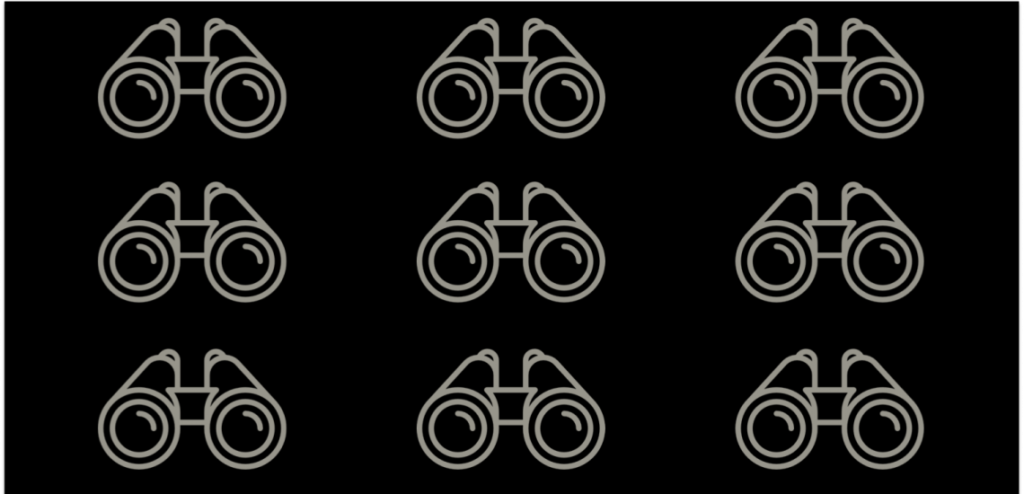
In response to the incident in New York involving birder Christian Cooper, and ongoing Black Lives Matter demonstrations in USA and worldwide – as well as in encouragement of the first #BlackBirdersWeek – BirdLife staff based in the UK, Senegal & Kenya voice their reflections and advice as birders.
“We are changing the face of birding”, said Corina Newsome, joint leader of #BlackBirdersWeek. “This effort was borne out of a large friend group of Black scientists and outdoor explorers who want to make sure the world knows that Black birders belong here, we are thriving, and our community is growing. We want members of our community…to know that they are welcome here and to not be deterred by people who have attempted to make these spaces hostile to us.”
Someone who experienced hostility first-hand is Christian Cooper, a board member of New York City’s Audubon Society, a Chapter of Audubon (BirdLife’s Partner in the USA). Audubon have issued a statement in response to the incident in Central Park, New York.
As Cooper himself said in an interview with the New York Times, which echoes BirdLife’s own sentiment: “We should be out here. The birds belong to all of us… The birds don’t care what color you are.”
The experiences relayed by BirdLife staff below are, thankfully, largely positive, and show that birding can, and should, be a joyous and inclusive experience for everyone: an important inspiration during these crucial times.
“Not a white man’s hobby” – Hazell Shokellu Thompson
Environmental Consultant; Former BirdLife Global Director, Partnership, Capacity & Communities; and BirdLife’s Interim CEO (2014-15)
I was born and raised in Freetown, Sierra Leone and have had a lifelong passion for wildlife and birds. Here, early on, I was used to being viewed as the crazy “birdman”. I had to become adept at explaining the value of birds and pointing out that birding was not a “white man’s hobby”. This turned out to be good practice for teaching Biology to University of Sierra Leone students (another passion) and for a 20-year career in conservation with BirdLife International. Luckily, in Sierra Leone, we now have a small – but growing – band of young birders.
As a black man, I have gone birding all over the world as part of my job and I also go birding regularly for leisure in the UK – all without incident. I often say that birders always come across as a very amiable bunch, regardless of race. This was why the awful racial events of the last week in the USA (one involving a black birder, another a racial murder) came as such a dreadful and painful hammer-blow to my hopes of an increasingly globalised and colour-blind world.
Working at BirdLife was an amazing opportunity to work with and learn from birders and conservationists from every race, colour and orientation in the world. Just like the birds we worked with, the BirdLife Partners know no boundaries in their efforts to save birds globally; making the linkages, partnerships, and collaborations across continents to do so. Underpinning all of this was the joy of birding, and the will to build the capacity of young conservationists wherever we could.
In retrospect, I start to wonder why I was usually the only black man on UK reserves when I went on birding trips? Also, what if I had not usually been in groups when I went birding around the world or had been much younger (most racial attacks target young men or women); would my experience have been different? These thoughts reveal the danger we must all avoid, i.e. the mistrust and fear these events have stirred. We must not let these horrific events hold us back; we (black, white, people of all colour) must press for change personally and collectively. Racism, police brutality against blacks and abuse must stop, everywhere it occurs – including the UK. We must live and expand the BirdLife ideal of inclusivity, diversity, and enjoyment of nature by all.
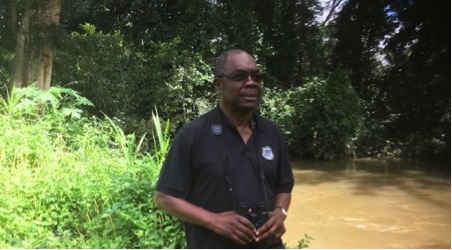
The power of many, and humanity as one – Julius Arinaitwe
Director of Partnership & Capacity Development, BirdLife International
When BirdLife launched the #1planet1right campaign some weeks ago, it really meant what it says on the tin. We have one planet whose health is critical for the survival of us all, humanity as one. And this is what it should be.
As if there are not enough challenges in fighting the COVID-19 pandemic, runaway emissions of planet-warming gases, large-scale habitat loss, and wide inequalities in terms of opportunities for self-actualisation, this month again in comes the rotten practice of racism! As a black man and a birder, I believe birders have no time and space for racism and other forms of discrimination.
I was introduced to birds as a young boy in Uganda, from the business end of a catapult. It wasn’t until I went to university in my early 20s that I exchanged this for a pair of binoculars. No one at the university or during my stint at Nature Uganda (BirdLife Partner) discriminated against me due to race.
After my studies, I joined BirdLife – and you do not get any more of a diverse workplace than within BirdLife when it comes to people. I have been fortunate to visit at least one Partner in each of the six BirdLife regions and go on birding outings with their members and staff. Consistently, I have found that their members harbour strong pride in ‘their birds’ and birding patches, and show them off to whoever shows interest. Due to the common interest that we share in birds, the primary focus of engagement on these outings is to have the best possible experience, seeing the birds at their best. Call me naïve, but discrimination has never come into the picture.
I know several bird guides from all walks of life. Birding is more than an income-generating activity; it’s a deep passion. Even when the target species may require long hours of searching and trekking, the desire to show the birds to the birders fires enthusiasm to endure. The bird guides strive to get each and every birder on the trip to have the best experience, by embracing – rather than penalising – diversity!
BirdLife with its network of 115 organisations in 113 countries mobilises broader constituencies that reach millions of people. We believe in the power of many – and work to mobilise as many people as possible to engage in the all-important task of securing a healthy natural planet for us all. We love birds as components of biodiversity and as ambassadors for all nature. We strive to increase the numbers of people who enjoy and protect them. Any discrimination defeats this underlying principle and has no room in society.
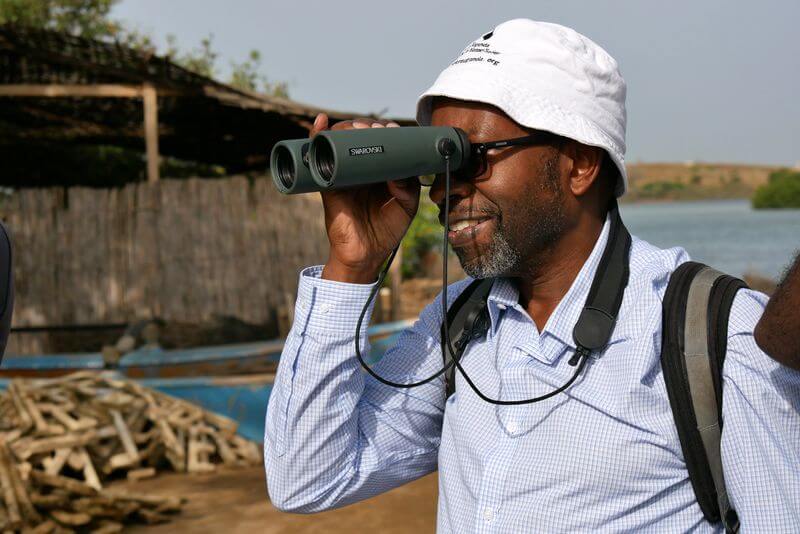
”Being a female birder calls for a strong personality and hard work” – Ngone Diop
Coastal Seabirds Project Officer, BirdLife Africa
I studied biology at Cheikh Anta Diop University in Dakar, at that time I had no idea that I will end up doing ornithological research and being passionate about birds. On my first fieldwork day, as I was undertaking my Masters degree, I could not identify any bird species, but was impressed by the number and diversity the birds.
This encouraged me to join a national NGO working on bird and biodiversity conservation (Nature Communauté Développement, NCD) where I became the Important Bird & Biodiversity Areas focal point, coordinating monthly waterbird monitoring in Dakar and surrounding areas, in addition to participating in several biodiversity conservation activities. Being a female birder calls for a strong personality and hard work, to earn trust.
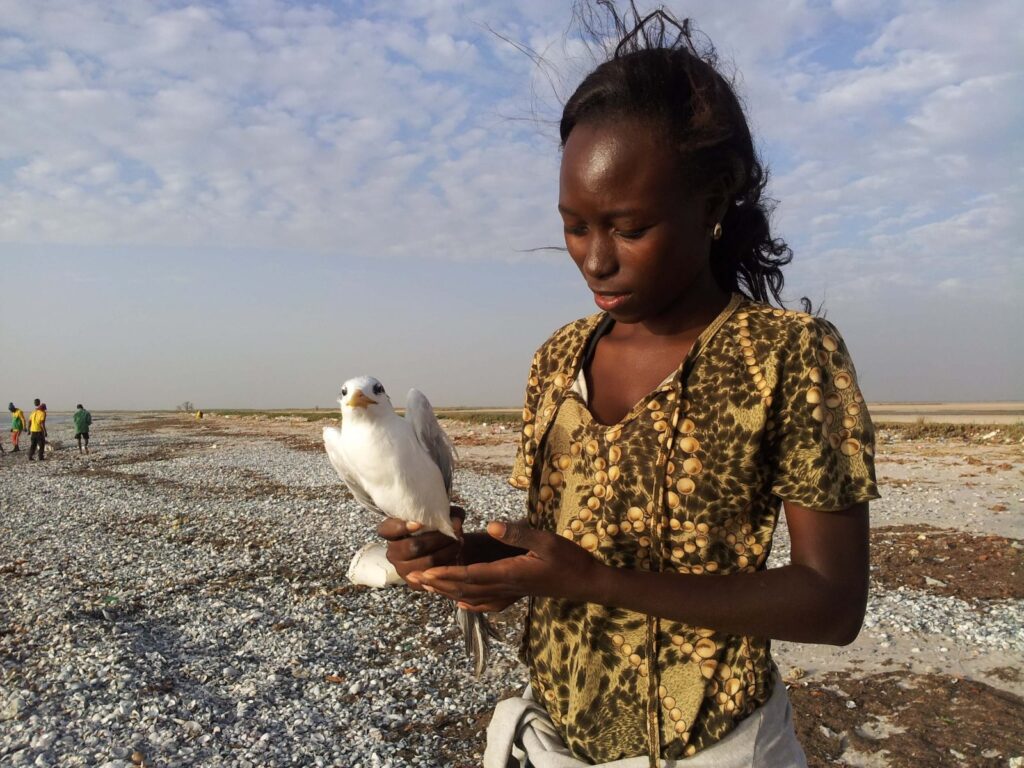
My positive experiences birding as a Black person: is it just luck? – Kiragu Mwangi
Senior Capacity Development Manager, BirdLife International
Last evening while sat in the back garden, I watched a pair of Blackbird males fight over territory, a pair of Dunnocks following their young fledglings from branch to branch, and a parent Wood Pigeon two chicks, now almost fully grown. Birding has been a simple and effortless hobby that gives pleasure to the soul; it emboldens the spirit when appreciating the beauty of nature. I came into birding by chance over 20 years ago through working for Nature Kenya, the BirdLife Partner.
For my work, I needed to study and appreciate them to a level of indicator species for an important site or habitat for conservation. To my surprise it never became a chore, but a pleasurable exercise either being part of monitoring teams or causal birdwatching with friends or alone.
With birding, I have been lucky to travel widely to many parts of the world, in all continents except Antarctica. On my travels, there has never been an incident where I have been mistreated by anyone. I suppose it has just been good luck or being in the company of good friends while birding in as far-flung places as Australia, Canada, The Cook Islands, Brazil, Russia, or in the USA. Even in remote, spectacular places far away from my community in Kenya, it was always easy to connect with strangers whilst birding.
The tragic killing of George Floyd in the USA, and the triggered civil rights protests for Black people, have given me pause to reflect deeply on how some people endure hardship and prejudice instead of the right to be treated with dignity; even, by extension, the right to enjoy the simple pleasure of birding without suspicion. I am humbled by Christian Cooper’s response to his experience in Central Park. His modest request to a white woman to leash her dog as instructed in Park notices could have turned into a sad affair, especially for Christian as an African American, who was just out birding.
Until these events in the USA, I have never thought of myself a ’black birder’ – perhaps I have just been lucky! We now have an opportunity to encourage other people of colour to come out and enjoy this simple pleasure, and the great outdoors. Even just one or two more taking up this simple hobby in their gardens.
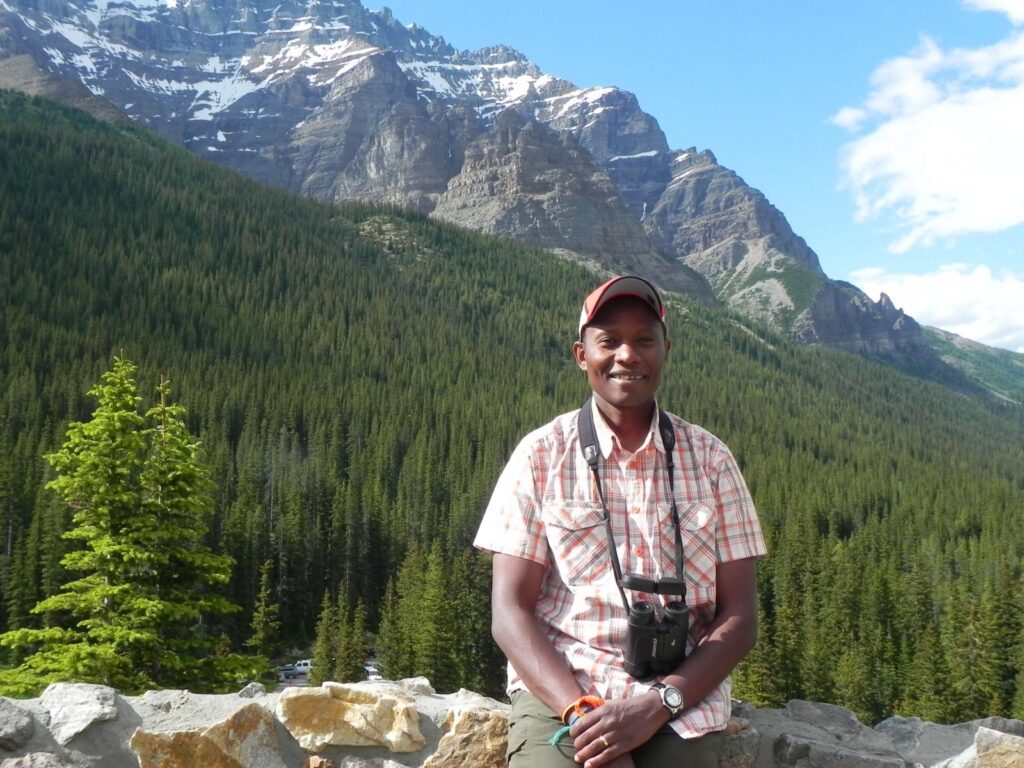
Birds can take you far – Kariuki Ndang’ang’a
Head of Conservation, BirdLife Africa
I didn’t realise it, but I had been birding since I was eight years old – those days when I would be sent out to take care of cattle in the wooded fields on the slopes of Aberdare Ranges, Kenya. It was not birding in the sense you are thinking about. It was the usual interaction with nature my friends and I did, sometimes tasting, touching, breaking and climbing and all those things that boys do. I knew every conspicuous plant and animal, including birds by my local name, and even had stories about them.
But it was birds, especially Turacos, pigeons, doves and weavers that really attracted me, and for different reasons. When I joined university and found a few members of the wildlife club ‘birding’, it immediately clicked and fell into place. I immediately found English names for the birds I knew already and started the ‘sport’ of knowing more. It has never stopped. My bird list is long. I have held probably thousands of birds in my hands, ringing them. I immediately looked for fellow ornithologists after university. Birds gave me a career and made me travel the world. Until today one of my brothers calls me ‘mundu wa ichocho’, directly translated as ‘man of thrushes’, and appreciates how far the ‘ichocho’ (thrushes) can take one.
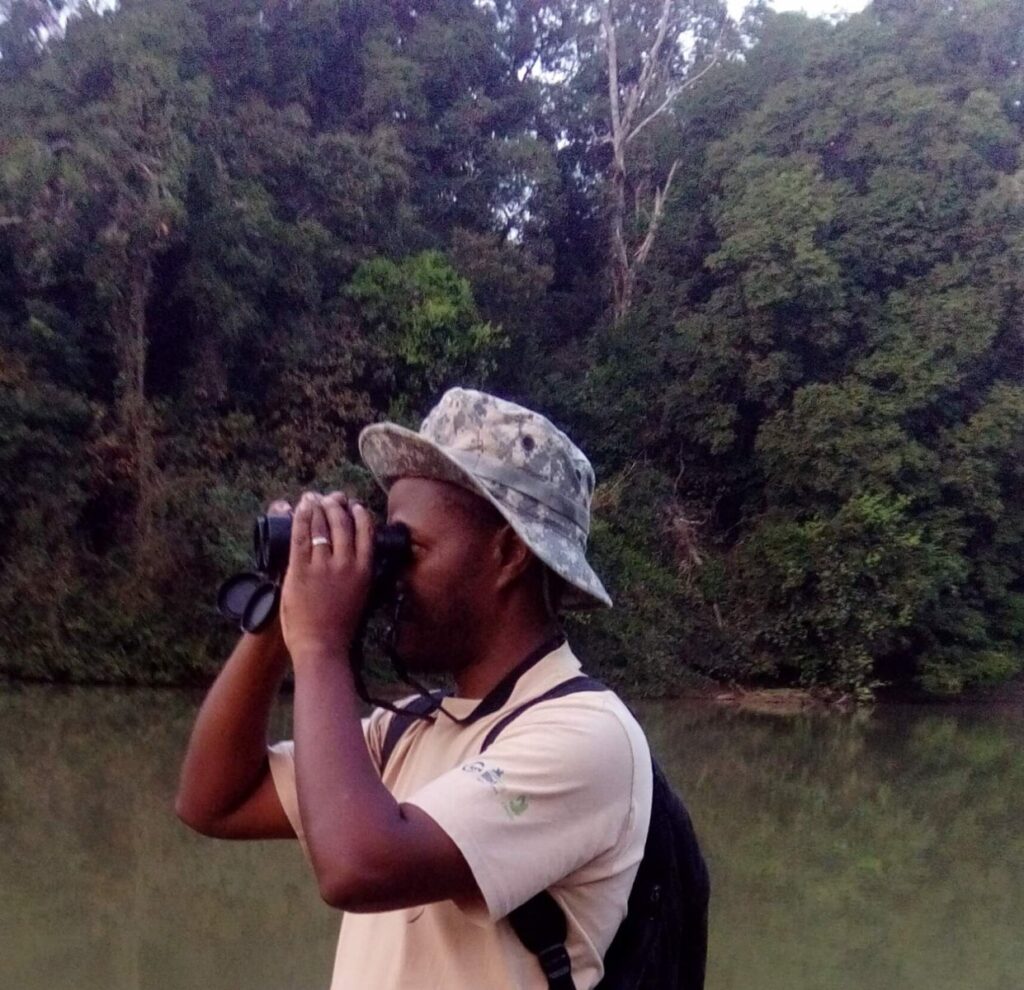
Stay up to date
Sign up to receive the latest bird conservation news. You’ll also receive updates about our projects, science and other ways to get involved including fundraising.
Thank you for your support, we are committed to protecting your personal information and privacy. For more information on how we use your data, please see our Privacy Policy. You can unsubscribe from emails at any time by using the link in the footer of any email from us.
